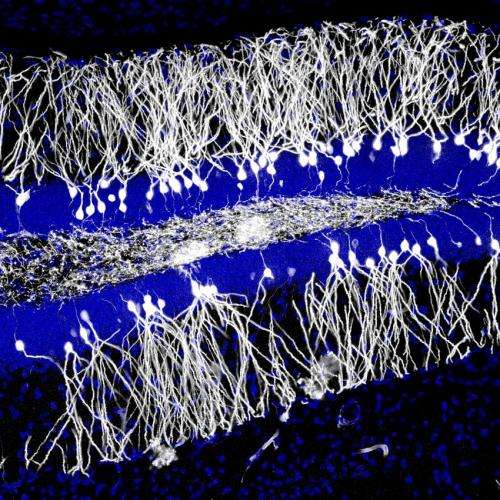May 9, 2014 report
Study of neurogenesis in mice may have solved mystery of childhood amnesia in humans

(Medical Xpress)—A team of researchers working at the University of Toronto in Canada may have found the answer to the question of why we humans tend to have little to no memory of the first few years of our lives. In their paper published in the journal Science, the team describes several experiments they ran on mice and other small mammals that revealed the impact of neurogenesis on memory and how what they learned might be applied to memory retention in people. Lucas Mongiat and Alegandro Schinder offer a review of memory studies and how the research by the team in Toronto fits in with what has already been learned in a Perspective piece in the same journal edition.
Scientists have known for just a couple of decades that a couple parts of the human brain continue to produce and use new neurons (neurogenesis) throughout a lifetime. One of these parts is the dentate gyrus in the hippocampus—an area of the brain that has been identified with memory. Scientists have also known that while neurogenesis surges during our first years of life, it slows dramatically as we grow older. Suspecting that this might have something to do with childhood amnesia, the researchers designed some experiments in mice and other animals which have similar types of neurogenesis to learn more.
In the first experiment, both young mice and older mice were taught (via electrical shock) to fear a certain cage. Both groups were then tested to see how long they retained that memory—the young mice forgot what they'd learned in just one day, while it took the older mice up to a month to do so.
Next, the researchers installed a running wheel inside the cages of a different group of adult mice to incite exercise—prior research has shown that exercise causes a speed up of neurogenesis. They also fed another group of adult mice drugs that increase neurogenesis. They then repeated the shock experiment on both groups. In both cases, the research team found that increasing neurogenesis caused the mice to forget their fear after just one day, just as with young mice.
In yet another experiment, the researchers used genetic engineering and drugs to slow neurogenesis in very young mice and found that doing so caused them to remember their shock experience for a longer period of time, emulating those that are older.
In analyzing their results, the researchers suggest that new neural growth that occurs before an event appears to "erase the board" a little bit, making way for new memories—something that has never been seen before. The results by the team will almost certainly lead to more studies as scientists continue to explore the mysterious mechanisms used by the brain to manage memory.
More information: Hippocampal Neurogenesis Regulates Forgetting During Adulthood and Infancy, Science 9 May 2014: Vol. 344 no. 6184 pp. 598-602. DOI: 10.1126/science.1248903
Abstract
Throughout life, new neurons are continuously added to the dentate gyrus. As this continuous addition remodels hippocampal circuits, computational models predict that neurogenesis leads to degradation or forgetting of established memories. Consistent with this, increasing neurogenesis after the formation of a memory was sufficient to induce forgetting in adult mice. By contrast, during infancy, when hippocampal neurogenesis levels are high and freshly generated memories tend to be rapidly forgotten (infantile amnesia), decreasing neurogenesis after memory formation mitigated forgetting. In precocial species, including guinea pigs and degus, most granule cells are generated prenatally. Consistent with reduced levels of postnatal hippocampal neurogenesis, infant guinea pigs and degus did not exhibit forgetting. However, increasing neurogenesis after memory formation induced infantile amnesia in these species.
© 2014 Phys.org

















